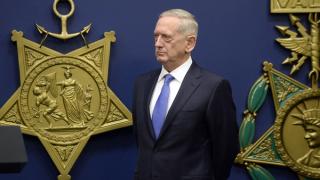US Secretary of Defence Jim Mattis is emerging as an alternative and status quo power centre in Donald Trump's administration, with a capacity to influence the White House's Asia policy in reassuring ways.
Mattis was in Japan and South Korea this month, making the first overseas visit by a Trump administration cabinet member. His decision to visit the two Asian countries ahead of other US allies was strategic: a signal of the priority the Pentagon will place on the Asia-Pacific.

But the trip also gave Mattis and like-minded National Security Council officials a golden opportunity to set the tone for this administration's engagement of US allies in the region.
Asian allies and partners have been deeply anxious since Trump labelled America's global alliances as "bad deals" for the US during the presidential campaign. Mattis needed to allay these fears by delivering two messages of reassurance.
The first was to reassure Seoul and Tokyo that the Trump administration would stand by its treaty commitments despite the President's prior hints that he would fundamentally rethink these longstanding security relationships. Although Trump had expressed support for both allies in leadership phone calls since the election, his private assurances weren't trusted and did not deal with specifics.
Mattis, by contrast, said all the right things. By affirming Washington's intention to deploy THAAD – a missile defence system – to South Korea as protection against North Korean missiles, and by explicitly stating that the disputed Senkaku/Diaoyu Islands were covered under Article 5 of the US-Japan Security Treaty, Mattis provided much needed substance to American security assurances.
In a stunning backflip on his election rhetoric, President Trump and Japan's Prime Minister Shinzo Abe issued a statement calling the "unshakable US-Japan alliance" the "cornerstone of peace, prosperity, and freedom in the Asia-Pacific", and outlined a vision for enhanced defence cooperation between the two nations.
More importantly, his very public declaration of support for the two allies appears to have bound President Trump to a more status quo position on Asian alliances. The evidence for this was on full display over the weekend.
In a stunning backflip on his election rhetoric, President Trump and Japan's Prime Minister Shinzo Abe issued a statement calling the "unshakable US-Japan alliance" the "cornerstone of peace, prosperity, and freedom in the Asia-Pacific", and outlined a vision for enhanced defence cooperation between the two nations.
The glowing affirmation of the alliance bore Mattis' fingerprints and was the product of weeks of behind the scenes work by Japanese officials and their American counterparts in the NSC and Defence, helped along by astute diplomacy and economic sweeteners from Abe. All of this served to nudge Trump towards a responsible policy on Japan that has been widely welcomed across the region.
But Asian allies are not only worried about America having their backs. Many fear Trump's hawkish stance on China, Taiwan and North Korea will inject unmanageable friction into US-China relations, leading to a more unpredictable and volatile Asia.
Accordingly, Mattis' second message on his Asia tour needed to reassure the region that Trump would not take a sledgehammer to Asia's major power balance.
On this front, Mattis did what he could within the confines of Trump's erratic comments on Asia. He hosed down rumours about American naval blockades of Beijing's South China Sea outposts and may have privately dismissed pre-emptive strikes on North Korea. But he said nothing to alleviate regional fears about the administration's strategy on China or Taiwan.
We now know that Mattis and Secretary of State Rex Tillerson, among others, were lobbying the President to honour the "One China" policy during conversations last week – explaining that the decades-old agreement to recognise China, not Taiwan, was the basis for stable US-China relations and in Washington's interests.
Their influence caused Trump to back down on his unprecedented threat to revise the "One China" policy, which he pledged to "honour" during a phone call on Friday with President Xi Jinping, again redirecting Asia policy in a more status quo direction.
All of this is reassuring for America's Asian partners, but it would be premature to conclude that Trump's policy is only in safe hands.
If Trump or his inner circle were to move against Mattis, there would be huge domestic bipartisan resistance.
Leaks from the White House over the past fortnight have revealed just how much influence President Trump's inner circle – Mike Flynn before his resignation, Jared Kushner, and especially Steve Bannon – have on security and foreign policy. While Mattis has chalked up several Asia policy wins, the tension between him and Trump's more unconventional advisers may come to define the administration's policy in the region.
Mattis' supporters fear that his reassuring signals could ultimately be temporary. Trump has the power to dismiss the Secretary of Defence at any time and replace him with an ideologue more closely aligned with his vision.
But while this is technically an option, it would be politically near impossible.
Mattis enjoys considerable congressional support, particularly from John McCain, the highly-respected chairman of the Senate Armed Services Committee. Senate Democrats, including Elizabeth Warren who sits on the committee, gladly approved a waiver to allow the former general to assume the top civilian post at the Pentagon. Many Democrats see him as a bulwark against Trump's potential adventurism.
If Trump or his inner circle were to move against Mattis, there would be huge domestic bipartisan resistance.
Mattis has also been relatively successful in battling transition officials on personnel choices. Bob Work, Deputy Secretary Of Defence under Barack Obama has been kept on as another safe pair of hands. Many senior Republican foreign policy experts and career bureaucrats, wary of serving in a Trump administration, will only be enticed into the Pentagon because Mattis is at the helm.
What's more, Defence wields considerable power in setting national security policy. The department has its own set of diplomats and a vast budget to throw behind its objectives. In conjunction with regional Combatant Commanders the Pentagon decides where and how military assets are deployed, despite the fact Trump is Commander-in-Chief.
Given Mattis' personal gravitas and his department's institutional heft, the Secretary's early success in stewarding President Trump towards traditional Asia policy principles is a stake in the ground for Asian allies. Whether or not Mattis can penetrate Trump's inner circle, he is beginning to lay the groundwork for a status quo power centre that may compete with the White House over Asia policy.
This gives America's Asian allies a reason to be reassured beyond Mattis' supportive words. Precisely because his removal would come at great cost to the administration, Trump's inner circle may find themselves forced to stand by the conventional Secretary.






